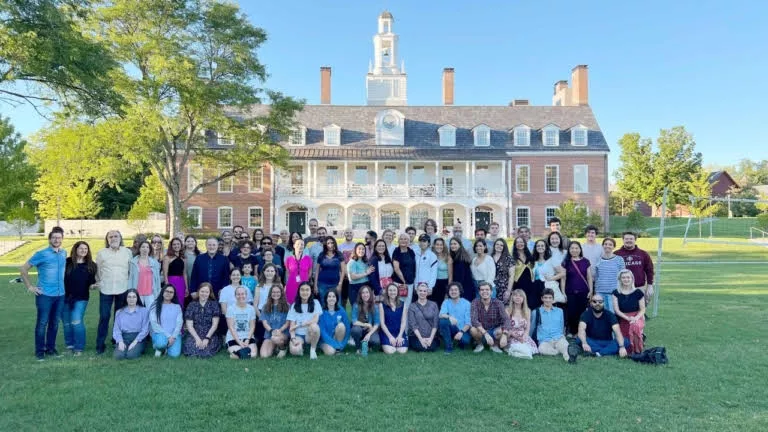Research & Travel

Middlebury Summer Intensive Language Program 2022
Off-Campus Study
A semester of off-campus study is usually possible for majors in classics. The department is a member of the Intercollegiate Center for Classical Studies in Rome and encourages interested students to participate, preferably in the fall semester of their junior year. The ICCS program offers traditional courses in Greek, Latin, Italian, Renaissance and Baroque art history, and a required two-credit course based on first-hand exposure to the archaeological and artistic monuments of the ancient world found in Rome, the Bay of Naples, and Sicily.
Summer Research Opportunities
Students may apply to the department for summer funding to support intensive summer courses in Latin and Greek, participation in archaeological field work abroad, internships connected with classics, or research projects undertaken with a member of the department.
Some summer programs recently attended by Swarthmore students:
- CUNY Summer Language Institute
- Berkeley Summer Language Programs
- Mt. Lykaion Excavation and Survey Project
- Azoria Project
Classics Department Summer Funding Application
Funds awarded from the Classics Department are in addition to Swarthmore's academic divisional fund awards. All students applying for summer funding must first apply to the Academic Divisions and then submit a Classics Department summer funding application. Classics applications are due March 3, 2025 and department funding decisions can be expected within 2-3 weeks.
Experiences
"The program exceeded my expectations and I thoroughly enjoyed my experience both on the excavation site and with the fellow program participants off site. The session was four weeks long and included 20 students. The excavation site itself was beautiful and featured views of the Mediterranean Sea from its cliff-side position on the Tuscan coast. We worked on the excavation 8:30-4:30 on weekdays and utilized the evenings and weekends for leisure and travel. Overall, the program was a great fit for my interests and I felt as though I made great connections with both my fellow students and my professors."
Amanda Roessler '24, Poggio del Molino Archaeological Field School, Populonia, Italy
"I can't recommend this program enough to any language enthusiast or aspiring Classicist; I have so many wonderful memories from the "Scuola Italiana," from driving around the beautiful Vermont countryside listening to Italian disco music to starting an Orlando Furioso reading group with a friend and a teacher. I know that the program has opened doors for me academically, as well, as I will be able to read scholarly texts in Italian and travel in Italy with more ease. I was amazed both by the level of Italian that I gained in seven weeks and the depth of the friendships that I formed communicating in a language that, at the beginning of the summer, I didn't know at all. Grazie al dipartimento dei classici per questa meravigliosa esperienza!"
Claire Pettit '25, Middlebury Summer Intensive Language Program, Vermont
"I spent five weeks in Vacone, a small hilltop town in Central Italy about an hour outside of Rome. Here I worked on an archaeological dig dedicated to excavating a Republican Roman villa, a project organized into a field school by Rutgers University and now in its final years. As a language student with a focus in Latin literature, this was a unique opportunity to experience a more materials and 'hands-on' approach to encountering the ancient world than I was used to -- and it changed the way I hope to study Classics in the future. Admittedly, I found the archaeological work itself quite intense, and one equally valuable lesson I learned this summer is that archaeology probably isn't the best long-term fit for me; however, I have become fascinated with potential ways to incorporate aspects of the material world into future research ideas, and the ways in which this materiality and language intersect. Anyone considering archaeology for the first time should be better prepared in their expectations than I was for a summer of arduous manual labor, often in difficult conditions such as extreme heat; but ultimately, I would also recommend that anyone interested in Classics or any related field try it at least once because the lessons I learned and the perspective it gave me are invaluable, and those weeks on-site will, in retrospect, be unforgettable for the good as much as the bad."
Joseph Petchauer '24, Rutgers University Archaeological Field School, Vacone, Italy
"Thanks to generous funding from the Classics Department, I was able to participate in the Summer Greek Workshop at UC Berkeley. This was my first time studying ancient Greek. After six grueling weeks of memorizing grammar, syntax and vocabulary about eleven hours a day, every day, we were rewarded with four weeks of literature electives. I spent these weeks reading Homer (excerpts from the Iliad) and Plato (excerpts from Symposium). As someone who's dreamed of reading the Iliad in Greek since she was fourteen, I couldn't have asked for a better summer!"
Sarah Geselowitz '16



